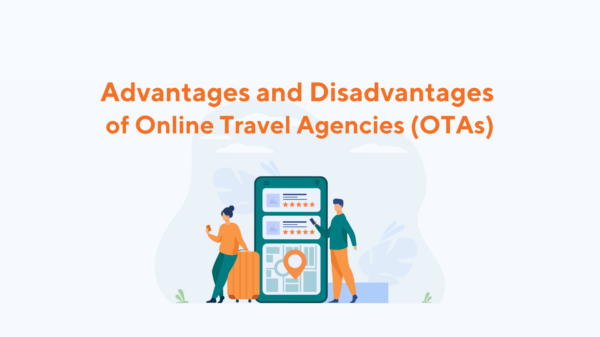Table of Contents
Goal setting is one of the most important activities you can undertake. Think of it as shaping the destiny and direction of your business for both the short- and long-term. And there’s no better time than the pre-season lull to spend some time setting goals for your tour business for the year ahead.
Your goals are a key driver for your business’s growth and prosperity. Identifying them involves taking a strategic approach to redefining your vision for the upcoming year. Following on from part 1 of this series, Time to Reflect: A Tour Business Review Can Set You Up for a Year of Success, we’ll show how to draw inspiration from your reflections on the past year to craft some SMART goals for the road ahead.
Reflecting on the past year before setting goals for your tour business
A deep dive into the past year is the best way to inform your goals for your tour business and make them as meaningful as possible. Here’s a brief reminder of what we covered in our article on reflection:

- Mine customer feedback: Look deeper into what customers are saying. Find common themes and areas where you can improve. Use both positive and negative feedback to make your services better.
- Do a financial health check: Take a close look at your earnings, profits, and how well your pricing strategies are working. Understand the balance between making a profit and giving value to your customers.
- Look under the hood: Evaluate how your tours and activities are working behind the scenes. Find any obstacles and simplify processes to make your operations more efficient.
- Review your marketing: Measure how well your marketing efforts are doing. See how far your message is reaching and how engaged people are on different platforms. Adjust your strategies to be more visible and attract a broader audience.
For example, a nature-oriented adventure company that reflects on customer feedback might spot that customers really appreciate their knowledgeable and engaging guides. When they shift into goal-setting mode, this insight could lead them to focus on further improving guide training programs for an even better customer experience. The ultimate goal could be to become the go-to company for nature-focused tours.
The importance of setting goals for a tour business
Linking your business goals to overall success transforms them from vague aims into powerful drivers for you, your team and your business in a few important ways:

- Motivating your team: Well thought out and clearly expressed goals can inspire and motivate your team. They help to instill a collective sense of purpose and an understanding of why what everyone does for the business is important and relevant.
- Planning for future growth: Your goals serve as a structured roadmap to guide your business through the dynamic and always-evolving tourism industry. Having a mix of short- and long-term goals enables you to celebrate milestones along the way, while still propelling your business forward.
- Building a shared vision: Ambitious, yet reachable, goals can create a shared vision among your team. This shared vision encourages a sense of ownership and unity to ensure everyone is pulling together in the same direction.
Let’s say you are an environmentally-conscious tour business with a goal to become a carbon-neutral tour operator. This is an example of a goal that includes all three of these elements. It not only aligns with your long-term commitment to sustainable tourism, but also motivates your team and creates a shared vision for the company.
Identifying areas for improvement for tour company success
After reflecting, you’re ready to begin the goal-setting process. Consider starting with a SWOT analysis. Identify your business’s Strengths, Weaknesses, Opportunities and Threats to build on your reflections and provide a comprehensive understanding of various specific facets of your business. Consider these practical steps:
- Data and performance metrics analysis: Dive into the data from the past year to identify areas of strength and weakness. This analysis serves as a foundation for setting goals that address specific needs. Without data, you’re just guessing.
- Customer and team input: Seek diverse perspectives by gathering input from both customers and team members. The collective insights offer a holistic view of your business, potentially uncovering valuable insights.
- Market trends and competition evaluation: Stay informed about industry trends and keep an eye on what your competitors are up to. This helps in identifying opportunities and challenges, which feeds into your goal-setting strategy.
Here’s another example. A company specializing in historical tours could analyze market trends and uncover an increasing demand for virtual tours. This could lead to a goal of developing immersive virtual experiences to cater to evolving customer preferences.
Something else to consider is incorporating a contingency plan into your goal-setting process. Anticipating potential challenges and preparing alternative strategies can help you stay nimble and react to the inevitable changes in the tourism sector.
Setting SMART goals for your tour business

Consider embracing the SMART criteria for goal-setting: Specific, Measurable, Achievable, Relevant and Time-bound. This framework ensures your goals are well-defined, understandable, realistic and actionable. Here’s how SMART goal-setting breaks down:
- Specific goals: Clearly define what you want to achieve. This clarity avoids confusion and gives a clear direction for your efforts.
- Measurable goals: Establish metrics to track your progress. Using measurable criteria helps gauge the success of your goals.
- Achievable goals: Make sure your goals are realistic and achievable. Setting goals for your tour business that are within reach prevents frustration and keeps team motivation high.
- Relevant goals: Align your goals with the overall mission and objectives of your business. This alignment ensures that every goal contributes to the larger vision.
- Time-bound goals: Set clear deadlines for goal achievement. Having targets with a definite deadline creates a sense of urgency, encouraging a proactive and focused work environment.
If your tour business is committed to delivering exceptional customer experiences, an example of a SMART goal is aiming to increase customer satisfaction by 15% (measurable and achievable) by the end of the year (time-bound) through providing personalized travel packages (specific).
Creating an action plan
Goal-setting doesn’t end with a list of goals in your desk drawer. You need to break down your SMART goals into actionable steps. Here are a few tips to building an action plan:

- Assign responsibilities strategically: Give team members tasks that match their strengths and skills. For example, you may have someone who is interested in social media and marketing, so they could manage your social accounts.
- Set realistic timelines: Create a timeline with clear milestones to track progress. Having a well-defined timeline adds a sense of urgency and ensures consistent progress toward your goals.
- Hold regular check-ins: Plan regular check-ins to review progress and adjust your plan as needed. These update sessions encourage open communication and proactive, collaborative problem-solving.
One idea is to incorporate small wins into your action plan. Breaking down large goals into smaller, achievable tasks provides a sense of accomplishment and maintains momentum. It also provides an excuse to regularly celebrate individual and collective achievements.
Monitoring the progress of tour business goals
It’s vital to keep a close eye on whether or not you are making progress toward achieving your goals. Consider practical steps such as:

- Track progress: Keep an eye on key indicators like customer satisfaction, revenue growth and how well your business operations and processes are running. Real-time data helps you make timely and informed decisions.
- Adapt to changes: Be ready to adjust your plan as things evolve in the travel sector. Being flexible in your strategy ensures your business can respond to changes in the market—both small changes to customer demand and large events like the COVID pandemic.
- Celebrate achievements: Take time to celebrate small victories to boost team morale and motivation. Recognizing accomplishments, no matter how small, creates a positive and encouraging work environment.
Staying flexible and adapting to change
As mentioned above, it’s important to acknowledge the dynamic nature of the tourism industry, and equip your business to cope with whatever the world throws at it. Here are a few practical ways to stay informed:

- Keep up with industry trends: Do regular research and keep your finger on the pulse of your industry. Being proactive in staying informed helps your business adapt to new and emerging trends.
- Encourage open communication: Fostering a culture of open communication makes it easier for your team to quickly address challenges and changes together.
- Embrace innovation: Be open to possible opportunities or new ways of doing things as they come up. This will help keep your business ahead of competitors.
Ready, set, go(al)…
As you embark on the new year, armed with reflections from the past and a clear vision for the future, setting some SMART goals for your tours is the best way to position your business for success. Here’s to another year of forward progress, achievement, innovation and prosperity for your tour business. Happy new goal-setting!
Search The Blog
Categories
Most Popular Articles
- 16 Innovative Tourism Business Ideas and Trends for 2025
- Your Marketing Mix: the 7 Ps of Travel and Tourism Marketing
- How to Get the Most Out of Guest Satisfaction Surveys
- Advantages and Disadvantages of Online Travel Agencies (OTAs)
- A Guide to Hiring in Tourism: Skills, Strategies, and Seasonal Staff





